

What are Cognitive Skills and Abilities? By: Dr.
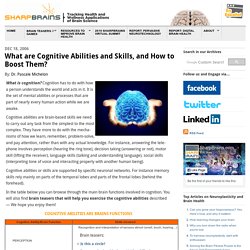
Pascale Michelon What is cognition? Cognition has to do with how a person understands the world and acts in it. It is the set of mental abilities or processes that are part of nearly every human action while we are awake. Cognitive abilities are brain-based skills we need to carry out any task from the simplest to the most complex. Health Literacy, Cognitive Ability, and Functional Health Status among Older Adults. Cognitive Ability - an overview. Dual-Process Models and Implications for Decision Making in Older Adults Cognitive ability is one of the possible contributors to choice set-size performance as well as preference, and dual-process models have been postulated to characterize the role of cognitive ability in decision making.
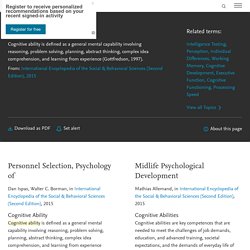
When making decisions, theorists proposed that information processing involves two types of procedures (e.g., Epstein, 1994; Kahneman, 2003): System 1, which refers to an affective/experiential system; and System 2, which refers to a more deliberative/analytical system. Aging & Cognitive Function. How does aging affect memory and cognition (thinking)?
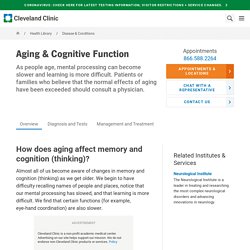
Almost all of us become aware of changes in memory and cognition (thinking) as we get older. We begin to have difficulty recalling names of people and places, notice that our mental processing has slowed, and that learning is more difficult. We find that certain functions (for example, eye-hand coordination) are also slower. Cleveland Clinic is a non-profit academic medical center. Advertising on our site helps support our mission. How common are dementia and Alzheimer's disease? It is generally acknowledged that dementia doubles in frequency every 5 years from the age of 65.
Dementia — and particularly Alzheimer's disease — represent very significant public health problems, since the percentage of the population in this age group is rapidly increasing. When should memory loss become a concern? This question is difficult because memory loss can be influenced by many factors. Enews. Cognitive Development in Late Adulthood. What you’ll learn to do: explain cognitive development in late adulthood There are numerous stereotypes regarding older adults as being forgetful and confused, but what does the research on memory and cognition in late adulthood actually reveal?
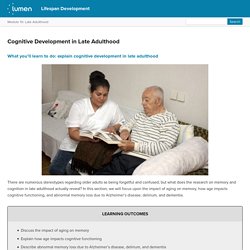
In this section, we will focus upon the impact of aging on memory, how age impacts cognitive functioning, and abnormal memory loss due to Alzheimer’s disease, delirium, and dementia. Learning outcomes. Subjective Cognitive Decline — A Public Health Issue. Available for Download Cdc-pdf[PDF – 2 MB] Subjective Cognitive Decline (SCD) is the self-reported experience of worsening or more frequent confusion or memory loss.1,2 It is a form of cognitive impairment and one of the earliest noticeable symptoms of Alzheimer’s disease and related dementias.2,3 SCD can have implications for living with and managing chronic disease, or performing everyday activities like cooking or cleaning.2 Because SCD is self-reported, it does not imply a diagnosis of cognitive decline by a health care professional.1,2 Cognition is a combination of processes in the brain that includes the ability to learn, remember, and make judgments.1 When cognition is impaired, it can have a profound impact on an individual’s overall health and well-being.1 Cognitive decline can range from mild cognitive impairment to dementia, a form of decline in abilities severe enough to interfere with daily life.1 Alzheimer’s disease is the most common form of dementia.1-3.
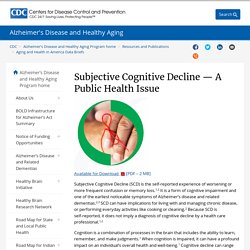
Factors Affecting Cognitive Function in Older Adults: A Turkish Sample. 1.
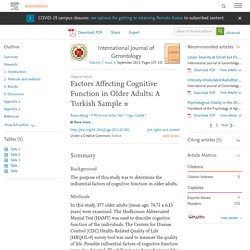
Introduction As our population grows older, the issue of improving the quality of life (QOL) of the elderly will become increasingly important. Subjective Cognitive Decline Among Adults Aged ≥45 Years — United States, 2015–2016. SCD can be a symptom of early-stage dementia conditions, including Alzheimer’s (1,2).
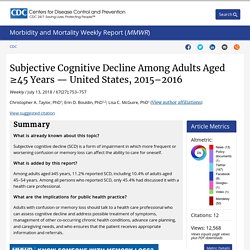
Not everyone who reports SCD will develop dementia, but some studies have shown that half of older adults with subjective memory complaints go on to develop more severe cognitive decline within 7–18 years (1,4,5). Even without progression to more severe cognitive impairment, SCD might signify a decreased ability for self-care. Inability to perform activities important to daily living such as preparing meals or managing money affect the ability to live independently and might also affect the ability to socialize or remain fully employed.
These findings are similar to those from an analysis of persons aged ≥60 years in 21 states from the 2011 BRFSS survey, which found a 12.7% prevalence of SCD (6). Cognitive Decline Among Older Adults. Image: A woman’s 78th birthday on 4th December 2005.
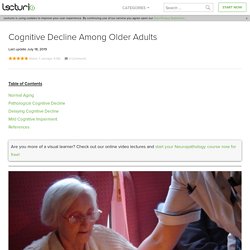
Ardencraig Care Home (Glasgow) by I Craig from Glasgow, Scotland. License: CC BY 2.0 Normal Aging. Cognitive Training for Older Adults Nov 14. Brain training may keep seniors sharper for 10 more years. CHICAGO -- A brief course of brain exercises helped older adults hold on to improvements in reasoning skills and processing speed for 10 years after the course ended, according to results from the largest study ever done on cognitive training.
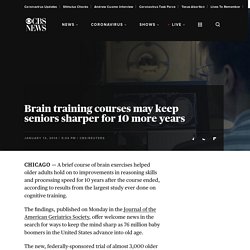
The findings, published on Monday in the Journal of the American Geriatrics Society, offer welcome news in the search for ways to keep the mind sharp as 76 million baby boomers in the United States advance into old age. The new, federally-sponsored trial of almost 3,000 older adults, called the Advanced Cognitive Training for Independent and Vital Elderly study (ACTIVE), looked at how three brain training programs -- focusing on processing speed, memory and reasoning ability -- affected cognitively-normal adults as they aged. People in the study had an average age of 74 when they started the training, which involved 10 to 12 sessions lasting 60 to 75 minutes each.
"What we found was pretty astounding. How to reduce the risk of cognitive decline with age. Research into how we can keep our brains healthy as we age has gained momentum in recent years.
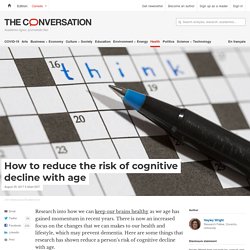
There is now an increased focus on the changes that we can makes to our health and lifestyle, which may prevent dementia. Here are some things that research has shown reduce a person’s risk of cognitive decline with age. Sex Our latest study shows that having more sex is associated with better cognitive function. We recruited 28 men and 45 women, aged between 50 and 83, to take part in our study. Learning New Skills Keeps an Aging Mind Sharp – Association for Psychological Science – APS. Older adults are often encouraged to stay active and engaged to keep their minds sharp, that they have to “use it or lose it.” But new research indicates that only certain activities — learning a mentally demanding skill like photography, for instance — are likely to improve cognitive functioning. These findings, forthcoming in Psychological Science, a journal of the Association for Psychological Science, reveal that less demanding activities, such as listening to classical music or completing word puzzles, probably won’t bring noticeable benefits to an aging mind.
Exercise regimen can maintain cognition in older adults, researchers say. May 31 (UPI) -- A review of clinical trials suggests that at least 52 hours of any exercise, over the course of six months, can best maintain cognitive performance in healthy older adults and those with mild impairment and dementia. Researchers at Beth Israel Deaconess Medical Center's Berenson-Allen Center for Noninvasive Brain Stimulation in Boston analyzed about 100 studies to find the optimal type and amount of exercise for older adults. Their findings were published Wednesday in Neurology: Clinical Practice. Cognitive stimulation activities for elderly, seniors & adults. What is cognitive stimulation?
Cognitive stimulation refers to a set of techniques and strategies that are directed to improve performance and efficacy of cognitive capabilities and executive functions such as working memory, attention, language, reasoning and planning, among others. Cognitive Benefits of Online Social Networking for Healthy Older Adults. We use cookies to enhance your experience on our website.By continuing to use our website, you are agreeing to our use of cookies. You can change your cookie settings at any time. <a href=" Find out more</a> Skip to Main Content Search Close Advanced Search Search Menu Article Navigation Volume 72 Issue 5 September 2017 Article Contents. Conclusion.